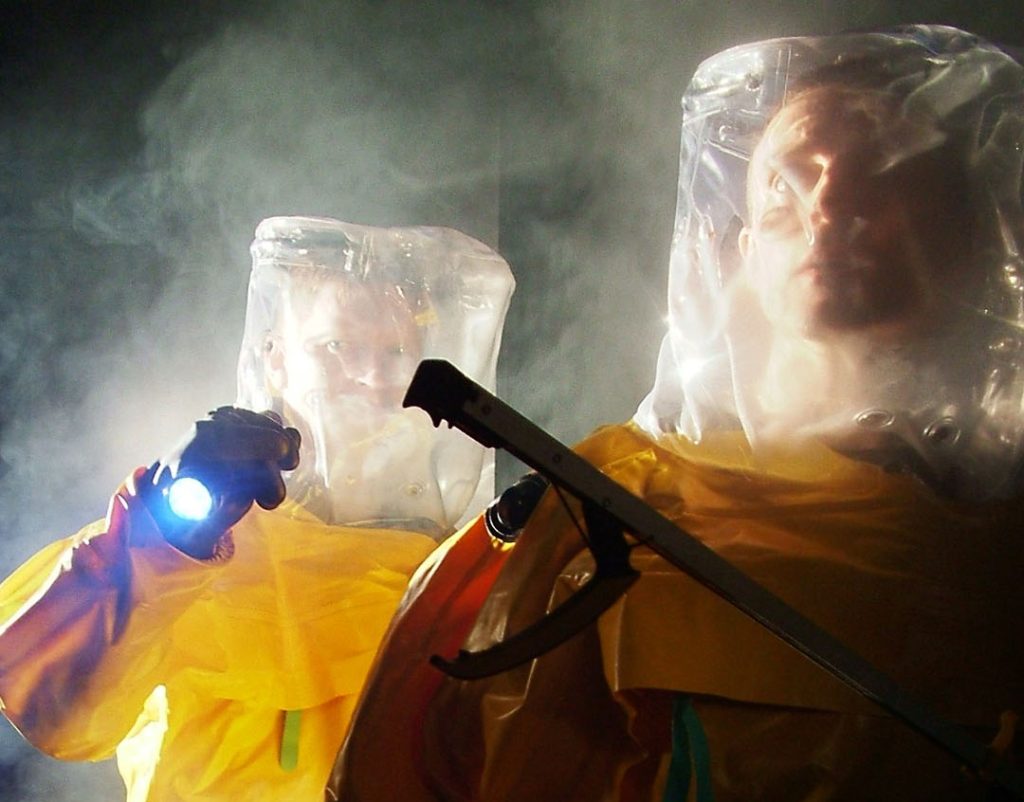by David Tushingham
(Extracted from programme notes for The Cleansing Of Constance Brown)

The Britons Stan’s Cafe are an extremely unusual theatre company. While their work is most definitely theatre, it rarely takes place in theatre buildings. Born out of the strange alchemy of financial necessity and improvisational flair, the company have become specialists in doing the most surprising things in the most unusual places.
In the decade I have been watching them I have seen them play a rock gig in a barn in the middle of nowhere, ask passers-by help them make a film in a shopping centre in Croydon, put people one at a time inside a darkened container and impersonate aliens trying to get home using the Birmingham urban transport network.
Stan’s Cafe works range in scale from It’s Your Film, a three minute theatre performance enacted exclusively for one member of the audience at a time (for their first appearance outside the U.K. at the Festival Theaterformen 2000 in Hannover, we booked 600 performances) to the version of Of All The People In All The World created for Theater der Welt 2005 in Stuttgart, which featured over six billion grains of rice, one for every human being on the planet at the time, with a total weight of 104 tonnes.
The diversity of their output makes them hard to define and almost impossible to predict. However, at the heart of most of their works there is a simple idea, which is then pursued with an extreme boldness bordering on recklessness. All this is done within a company style which is approachable and unassuming. The name Stan’s Cafe, for example, is always written rather modestly in lower case and the preferred pronunciation of cafe is distinctly northern, proletarian ‘Kaff’ instead of the posher, potentially pretentious ‘cafe’.
Exactly who Stan was is unclear, but his caf (sorry, ‘Kaff’) was a cheap and cheerful diner near Brick Lane where James Yarker and Graeme Rose used to go when they were talking about starting the company. Stan’s Cafe the place was somewhere people were welcome, that gave them things they needed like food and warmth at a low price and where they had a chance to dream a little. Stan’s Cafe the theatre company aspire to do something similar.
Their present project, The Cleansing of Constance Brown, is set in a corridor. This is a place of passage, of transition, somewhere for chance encounters and meetings that just fail to happen. It is a place that is marginalized, where people are excluded from real power, separated from the scenes of momentous decisions and key acts by the thickness of a wall or a door. It shares with the company’s other works a deliberate choice to focus on the peripheral and make that the centre and to view a wide spectrum of events through a very narrow perspective. In this case literally. Images spanning several centuries are concentrated into a performance space just two metres wide.
If you’re reading this programme, then the chances are you’re one of only 25 members of the audience a large enough number, hopefully, for no-one to feel lonely, yet at the same time intimate enough for each one to feel privileged and valued, to feel that their own personal presence has in some way contributed to the evening. Not only have the sets, costumes and props been constructed specially for this production, but the whole theatre, including sound and lighting and the auditorium. The entire performance takes place inside an autonomous free standing structure which needs nothing more than a roof and an electricity supply. A giant plug-and-play device. Like the biggest, slowest, certainly the heaviest, and quite possibly the most expensive iPod in the world. But with you sitting in it.
If I had more time I could write much more about the skill with which Stan’s Cafe have dealt with their aesthetic inheritance from Forced Entertainment and other predecessors in the British experimental performance scene and gone on to create a mature body of work defiantly and exuberantly their own, about their ability to bridge the gap between culturally-literate audiences and those who only ever stumble across organized culture by accident and how important that is in our increasingly polarized societies, about the show they did set in the future after all industry has died where the performers had to generate all the electricity to power the lights and sound system live on stage, or about the extended programme of work they have done proving to schoolchildren that they really can be artists. But I’ll settle for this:
In a world where all artists have to claim they are innovative, Stan’s Cafe are the real thing. Enjoy.
David Tushingham 2007


